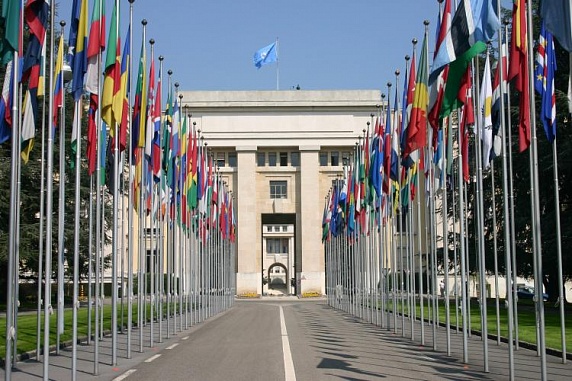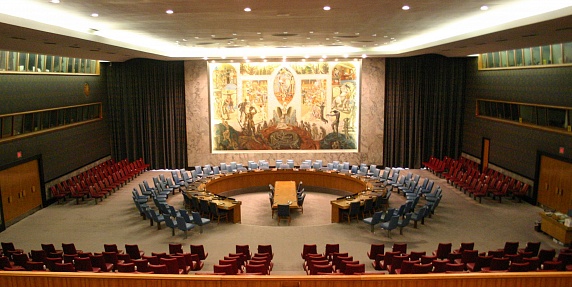 ONU
ONU
RIA NOVOSTI'S INTERVIEW WITH ALEXANDER YAKOVENKO, SPOKESMAN OF RUSSIA'S MINISTRY OF FOREIGN AFFAIRS, ON AN UPCOMING VISIT TO MOSCOW BY COLIN POWELL, U.S. SECRETARY OF STATE
Q: What are the priorities of Mr. Colin Powell's forthcoming visit to Moscow?
A: Colin Powell, US Secretary of State, will appear in Moscow on a routine visit, May 14-15, in compliance with an available understanding. He will meet Igor Ivanov, Russia's Minister of Foreign Affairs, at the negotiation table in several rounds of talks.
The Parties proceed, above all, from a priority task - to further strengthen the partnerly basis of Russo-US relations, and guarantee progress of, and predictable developments in those relations, which are among the key factors of global security and stability.
Russian-US summitry is timed to the upcoming St. Petersburg tricentennial celebrations and the nearest of the regular G8 summits, due in Evian, France. Those top-level Russian-US contacts mean to give an impetus to bilateral interaction in every sphere, and preparations for such contacts will be the principal goal of the Ivanov-Powell talks. The negotiators will analyse the entire range of issues on the current Russian-US agenda - in particular, strengthening strategic stability and mass destruction weapons nonproliferation, combat against international terrorism, team efforts to settle regional conflicts, and promotion of bilateral contacts and mutually lucrative economic partnership. The role of the United Nations and the entire international community in postwar Iraqi rehabilitation will be among matters in the foreground, and that is quite natural.
Q: The negotiators - foreign political chiefs of the two Great Powers - can be expected to discuss global problems, among others on the agenda.
A: You are right. Among other matters, priority will be given to issues pertaining to strategic stability, security and nonproliferation. To bring to final success ratification of the treaty on strategic offensive reductions, signed in Moscow, will be one of the key issues. The US Senate ratified it this past March. We hope the State Duma will ratify it within May. Next come analyses of the ways and means to reduce strategic nuclear arsenals in compliance with the treaty. The negotiators will go on discussing cooperation in anti-missile defence.
Detailed debates are envisaged of the present state of, and further prospects for an alliance against mass destruction weapons proliferation. International legal mechanisms of nonproliferation must be buttressed, and are not to be undermined by unilateral steps. We regard that as key aspect of the problem.
The negotiators will analyse the implementation of a G8 Kananaskis summit initiative for global partnership against proliferation of mass destruction arms and materials. Everyone sees how important the success of that initiative will be from the viewpoint of counteracting the interconnected problems of WMD proliferation and international terrorism. President Vladimir Putin explicitly defined our priorities in that sphere - utilisation of discarded submarines, and chemical arsenal destruction. There is another key aspect of the problem. That is further implementation of the bilateral Nunn-Lugar programme. Russia has been receiving assistance on that programme for ten years now to dispose of its mass destruction arsenals and strategic carriers as it reduces them in compliance with its international obligations.
The negotiators will discuss the implementation of summit understandings for a new nature of Russia's relations with NATO - in particular, in the context of a NATO-Russia Council session, soon to gather in Madrid at a ministerial level.
Q: Under what angle will Igor Ivanov and Colin Powell regard burning topics on the international agenda?
A: Developments round the North Korean nuclear programme are among the most acute issues. Russia is consistently working for political and diplomatic settlement. Nuclear-free status of the Korea peninsula, and safe progress of the two Korean states are the final goals of such settlement. We look forward to a detailed opinion exchange - mainly in the context of US-North Korean-Chinese consultations, which have opened in Beijing to find a way to peaceful crisis settlement. If necessary, Russia is willing to join the negotiation process.
The Parties will exchange opinions on principal global and regional issues - certainly including developments round Iraq after the coalition's armed action. As for Iraqi post-conflict rehabilitation, here Russia is consistently arguing for the Iraqi settlement process to return as soon as possible into the international legal channel with the United Nations and its Security Council to play crucial part. The negotiators also intend to discuss current humanitarian developments in Iraq. It will promote the interests of all members of the global community to reach an accord on universally acceptable terms of UN participation in the many matters pertaining to the Iraqi situation. That is the point from which we proceed.
The Parties will carry on discussion of team efforts for Mideastern settlement. To urgently implement the roadmap, which the international mediating quartet has made public, and to launch implementation monitoring are part and parcel of such efforts.
Afghan developments are also essential among global and regional issues - in particular, Russian-US alliance against the drug threat coming from Afghanistan.
The negotiators will also analyse the progress of Russian-US alliance on a bilateral and multilateral footing against international terrorism and other latest challenges; and the two countries' prospects for closer coordination of efforts to repulse the terrorist threat as connected with the use of mass destruction weapons, and to block the channels of terrorist financing.
Q: To what extent will the negotiators tackle bilateral relations?
A: They will have detailed discussions of bilateral economic cooperation, with an emphasis on energy and banking dialogues and high technology cooperation - in particular, for civil-oriented space efforts. The Parties intend to evaluate negotiation prospects for Russia to join the World Trade Organisation, the Organisation for Economic Cooperation and Development, or OECD, for full membership of the international commission against money laundering, and to finally get out of the action of the notorious Jackson-Vanik amendment.
Igor Ivanov and Colin Powell will certainly regard other topical aspects of bilateral relations, as well.









